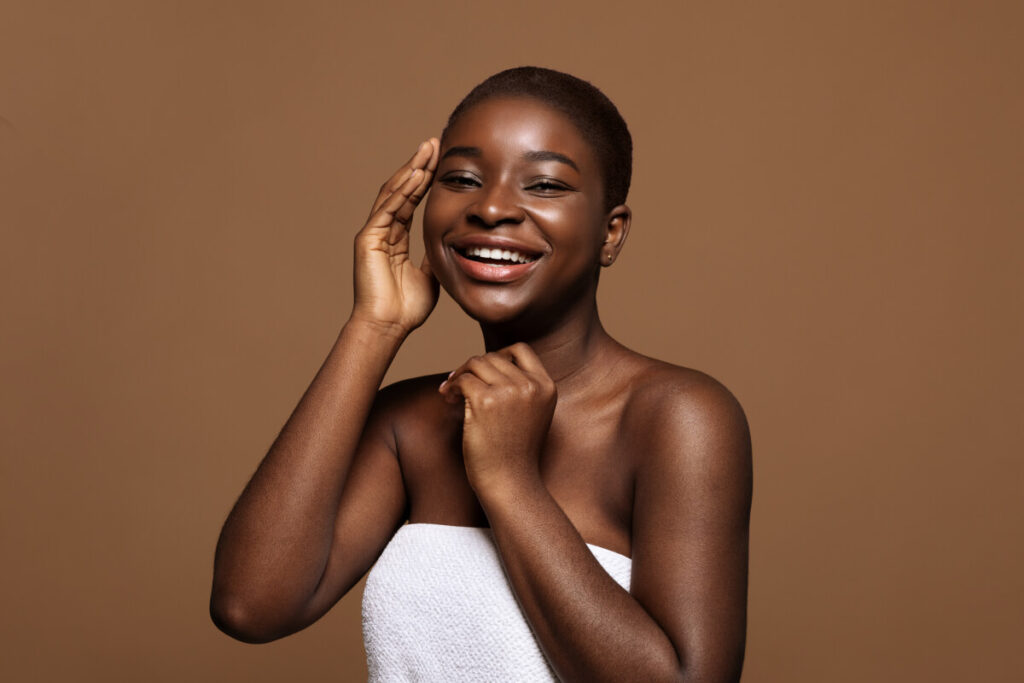No matter how you style your hair, you need a head of healthy and hydrated hair to produce the best results. When your hair is dry, brittle, and prone to falling off, it can be difficult to style your hair or use hair care products to temporarily make it look healthier. And one of the ways to maintain good hair health is to ensure you’re getting enough vitamins and minerals that can support healthy hair growth – including vitamin C.
So what does vitamin C do for your hair? We can narrow it down to three main ways vitamin C is important for your hair: for antioxidants, for collagen production, and for iron absorption. Here’s what you need to know about vitamin C and how it can affect your hair.
What Can Vitamin C Do for Your Hair?
Some of the benefits of vitamin C (or L-ascorbic acid) include helping the growth, development, and repair of body tissues. It’s also essential; in body functions like immune function and absorbing other nutrients from food. It also can strengthen areas like your bones, teeth, and cartilage.
When it comes to your hair, vitamin C can help improve hair growth to produce healthier and stronger hair. This is through increasing collagen and assisting in good blood flow to your scalp. For existing hair, it can help prevent your hair and scalp from drying out from the effects of the sun.
Antioxidants to Protect Your Hair from Free Radicals
Vitamin C is a powerful antioxidant that can neutralize free radicals. Free radicals are incomplete atoms and molecules that can damage your body’s cells. While these can come from activities like exposure to the sun’s UV rays, your body can also produce free radicals. When you are surrounded by more free radicals than antioxidants, you develop oxidative stress, which can age your cells faster.
Your hair is vulnerable to free radicals outside your body, which puts it at risk of aging, losing its natural oils, and becoming dry and brittle. With a potent antioxidant like vitamin C in your system, you can protect your hair from premature aging.
Increased Collagen for Hair
Collagen is a type of protein your body needs for your hair, skin, and nails. Your hair strands compose of cells and proteins, and collagen is one of the essential proteins that can promote healthy hair. Proper collagen formation and build-up of these proteins require vitamin C.
If there is enough vitamin C in your body, your body can use your collagen’s amino acids to build stronger hair while also strengthening your roots and scalp. This can prevent breakage and hair fall. And by developing healthier hair with more collagen, vitamin C can also help prevent follicle damage, premature graying, and a flaky scalp.
Improves Iron Absorption to Help Hair
Iron is essential for your circulatory system, especially for transporting oxygen throughout different parts of the body. When you have an iron deficiency, it can be difficult for your circulatory system to pump blood and oxygen towards the upper parts of your body.
Vitamin C can help with the absorption of iron. People with conditions like celiac disease or Crohn’s disease have a difficult time absorbing iron from food and dietary supplements. Vitamin C can help you absorb non-heme iron and convert it into a form of iron that’s easily absorbed by your body. As a result, your scalp and hair follicles have access to healthy blood flow, which can help stimulate growth.
Signs of Vitamin C Deficiencies in Your Hair
Lacking vitamin C can result in visible symptoms that you should look out for. This can include dry skin, wounds that heal slowly, and bleeding gums. But for your hair, you should look out for dry, brittle hair that’s prone to splitting and hail fall.
In case you notice these signs in your hair along with other signs of vitamin C deficiencies, you may want to visit your doctor to determine if you’re dealing with a vitamin C deficiency (or any other nutritional deficiencies) and recommend taking vitamin C supplements or adjusting your diet to add more food sources of vitamin C.
Taking Vitamin C Supplements

Vitamin C supplements are a good alternative for those whose diets are lacking in vitamin C. It’s a good option for those with deficiencies. However, if you’re planning on taking vitamin C tablets to improve your hair growth but don’t have a deficiency, there’s little evidence to suggest this will be effective.
For most people, a balanced and healthy diet is enough to give them the vitamin C intake they need. The recommended dietary allowance for adults is 90 milligrams for men and 75 milligrams for women every day. Pregnant and breastfeeding women need a slightly higher amount of up to 120 milligrams per day.
However, like all other vitamins and nutrients, too much vitamin C can be bad for your health. Vitamin C’s tolerable upper level intake is 2,000 milligrams, which is the maximum daily intake of vitamin C you can take that’s unlikely to harm your health. Anything more than that, and you could be at risk of gastrointestinal problems.
Vitamin C overdoses are rare, but too much vitamin C can be dangerous for people with certain conditions. For instance, people with hemochromatosis that have too much vitamin C in their system can absorb too much iron, which can lead to tissue damage. Vitamin C can also affect the effectiveness of medications of certain conditions like heart disease and cancer.
Natural Sources of Vitamin C
Vitamin C can be easily found in a number of fruits and vegetables. Vitamin C cannot be stored in your body like other water-soluble vitamins like vitamin A, E, and D. This means if you’re not taking vitamin C supplements, you need to eat daily intake of vitamin C every day. This can include:
- Citrus fruits (oranges, grapefruit, yuzu, lemons, etc.)
- Peppers
- Bell peppers
- Strawberries
- Blackcurrants
- Cantaloupe
- Broccoli
- Brussel sprouts
- Potatoes
Other Vitamins That Can Improve Hair Growth

If you find that a vitamin C deficiency isn’t the cause of poor hair health, check with your doctor if you have a deficiency for any other of the essential vitamins. Here are the other vitamins you might consider taking supplements for if you have a deficiency:
Vitamin A
Vitamin A is essential for cell growth for developing tissues like hair, which is the fastest-growing tissue in the body. It can also assist with sebum production and keeping your sebaceous glands functioning normally. Sebum is what keeps your skin, scalp, and hair hydrated and healthy, and it’s what gives hair its natural oils to prevent it from drying up. Avoid taking too much vitamin A, though, since this can trigger hypervitaminosis A and result in hair loss.
Dairy products, eggs, animal liver, leafy green vegetables, and yellow, red, and orange vegetables are good sources of vitamin A.
Vitamin B Complex
B-vitamins can help your circulatory system by assisting blood flow to the scalp and hair follicles. Sufficient blood flow and oxygen can provide your hair with the oxygen it needs to sustain healthy hair growth. Out of all the B-vitamins, biotin (Vitamin B7) is specifically linked to hair loss in humans.
Most B vitamins are found in both animal and plant-based food sources. Vitamin B12 is only found in animal products, so vegans and vegetarians may need to take B-vitamin supplements to get all the B vitamins they need.
Vitamin D
It’s unknown how vitamin D levels affect hair growth. However, studies suggest that those with low vitamin D levels experience hair loss more frequently. You can get vitamin D by direct sun exposure, but you can also get it from food sources like fatty fish (such as tuna, salmon, sardines, etc.) and mushrooms.
Vitamin E
Like vitamin C, vitamin E is also an antioxidant that can protect your hair from the sun’s UV rays and harmful free radicals. This can prevent your hair from drying out and premature aging. Sunflower seeds, avocados, and spinach are some good food sources to get healthy doses of vitamin E.
Ask your doctor to check for any nutritional deficiencies. If you do not have a deficiency, your hair loss may be caused by an underlying medical condition (like an autoimmune condition or thyroid disease), genetic hair loss, or poor hair care practices.
Shop for High-Quality Hair Care Products at FACE Med Store
Vitamin C can protect your hair from free radicals causing premature aging and hair damage, assist protein build-up for stronger hair, and improve blood flow to your scalp and hair follicles. If you suspect you have a vitamin C deficiency, talk to your doctor first before taking vitamin C supplements. These supplements can give you the nutrients you need to avoid the symptoms of a deficiency – including unhealthy, brittle hair.
For all your hair care, health, and cosmetic products and supplies, shop at FACE Med Store. We offer competitively-priced products for everyday users and businesses looking for affordable stores to source high-quality products. Check out our online store for special deals and promotions today.






